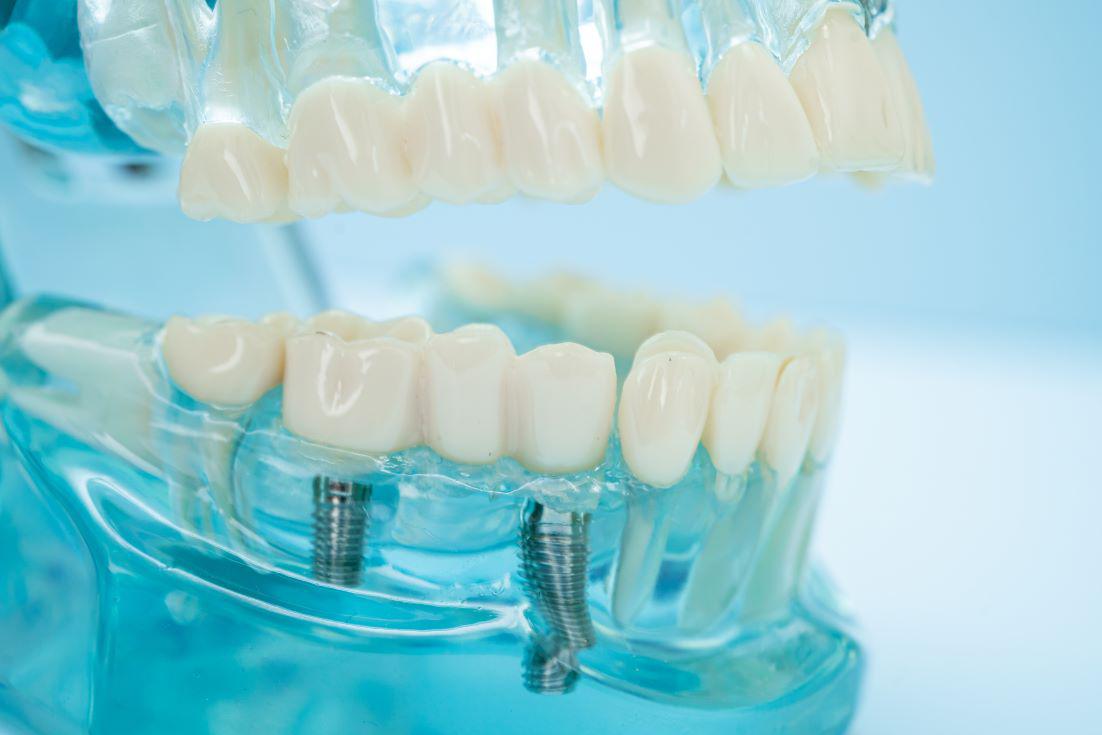Dental implants are made from materials like titanium or zirconia, which are resistant to decay, but they’re not immune to plaque and bacteria. The tissue around the implants, known as peri-implant tissue, is susceptible to infection if not cared for properly.
Without regular cleaning, plaque and bacteria can build up around the implant, leading to inflammation, gum disease, and bone loss. In severe cases, the implant could fail and need to be removed. Proper care helps keep the surrounding tissue healthy, reduces the risk of infection, and ensures the implant remains secure.
Daily Cleaning Routine for Dental Implants
Maintaining your dental implants requires a consistent and thorough oral hygiene routine. Here’s how to clean your dental implants effectively:
1. Brush Twice a Day
Just like natural teeth, dental implants need to be brushed at least twice a day. Use a soft-bristled toothbrush, either manual or electric, to gently clean around the implant. Be sure to brush all surfaces of the implant crown, including the area where it meets the gumline, as this is where plaque can easily accumulate.
2. Use Low-Abrasive Toothpaste
Avoid using abrasive toothpaste that could scratch the surface of the implant or damage the surrounding gum tissue. Opt for a low-abrasive toothpaste that is gentle on your dental work. Look for toothpastes designed for sensitive teeth, or ask your dentist for recommendations.
3. Floss Daily
Flossing is crucial for removing plaque and food particles from between your teeth and around your implants. Use a floss designed specifically for dental implants or a regular floss that’s gentle on your gums. Carefully thread the floss between the implant and the adjacent teeth, and clean around the gumline without forcing the floss into the gum pocket.
For some patients, water flossers may be an effective alternative to traditional floss. Water flossers use a targeted stream of water to dislodge debris and plaque from hard-to-reach areas, including around dental implants. If you have difficulty with string floss, this can be a useful option.
4. Rinse with an Antimicrobial Mouthwash
An antimicrobial or antiseptic mouthwash can help reduce bacteria and keep your mouth fresh. Choose a non-alcoholic mouthwash, as alcohol-based products can dry out the mouth and irritate your gums. Swish the mouthwash around for 30 seconds to a minute to help kill bacteria that brushing and flossing may have missed.
5. Use an Interdental Brush
Interdental brushes are small brushes designed to clean between your teeth and implants. These brushes can be especially helpful for reaching tight spaces and removing plaque around the implant crown. Choose a brush size that fits comfortably between your teeth without causing discomfort or damage to your gums.
Additional Tips for Cleaning Dental Implants
In addition to your daily cleaning routine, there are a few extra steps you can take to ensure your dental implants stay in excellent condition.
1. Avoid Hard or Sticky Foods
Although dental implants are designed to be durable, certain foods can still pose a risk to their stability. Hard foods like ice, hard candies, or tough meats can put excess pressure on the implant, leading to damage. Sticky foods like caramel or taffy can also get stuck around the implant and are harder to clean.
2. Stay Hydrated
Drinking plenty of water helps wash away food particles and bacteria, keeping your mouth clean throughout the day. Staying hydrated also promotes saliva production, which is important for maintaining a healthy balance of bacteria in your mouth.
3. Avoid Smoking
Smoking is detrimental to both natural teeth and dental implants. It slows down healing, increases the risk of infection, and is a significant risk factor for implant failure. If you’re a smoker, quitting can greatly improve the longevity of your dental implants and overall oral health.
Professional Cleanings and Checkups
Even with an excellent at-home oral hygiene routine, professional dental care is essential for maintaining the health of your dental implants. Your dentist or dental hygienist can provide deep cleaning around your implants that reaches areas you may not be able to clean thoroughly at home.
1. Regular Dental Checkups
Schedule regular checkups with your dentist, at least twice a year. During these visits, your dentist will check the condition of your dental implants, assess the health of the surrounding gum tissue, and make sure the implant is secure. Early detection of any issues, such as peri-implantitis or gum disease, is critical for avoiding implant failure.
2. Professional Cleanings
During your checkup, your dental hygienist will perform a professional cleaning around your implants. They use specialized tools designed to clean around the implant without causing damage. This deep cleaning helps remove any tartar buildup that could contribute to gum disease or infection.
3. Monitor for Signs of Trouble
If you notice any signs of infection, such as redness, swelling, or bleeding around your dental implants, contact your dentist immediately. Early intervention can prevent more serious complications, such as bone loss or implant failure. Other signs to watch for include persistent bad breath, pain, or a loose implant.
Consistent Care for Long-Lasting Implants
Dental implants are a durable and effective solution for replacing missing teeth, but they require diligent care to ensure their long-term success. By incorporating a thorough cleaning routine into your daily life and visiting your dentist regularly, you can keep your implants and surrounding tissue healthy. Remember to brush, floss, and rinse with antimicrobial mouthwash to remove plaque and bacteria and take extra care with professional cleanings to ensure your implants stay in top condition.
With the right care, your dental implants can last a lifetime, providing you with a healthy, beautiful smile for years to come. Contact us today to set up your initial consultation!


